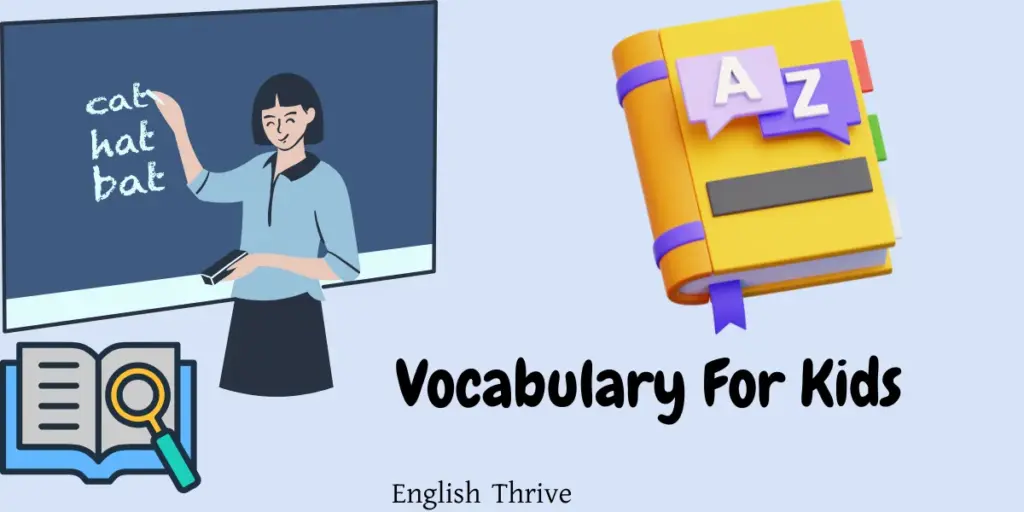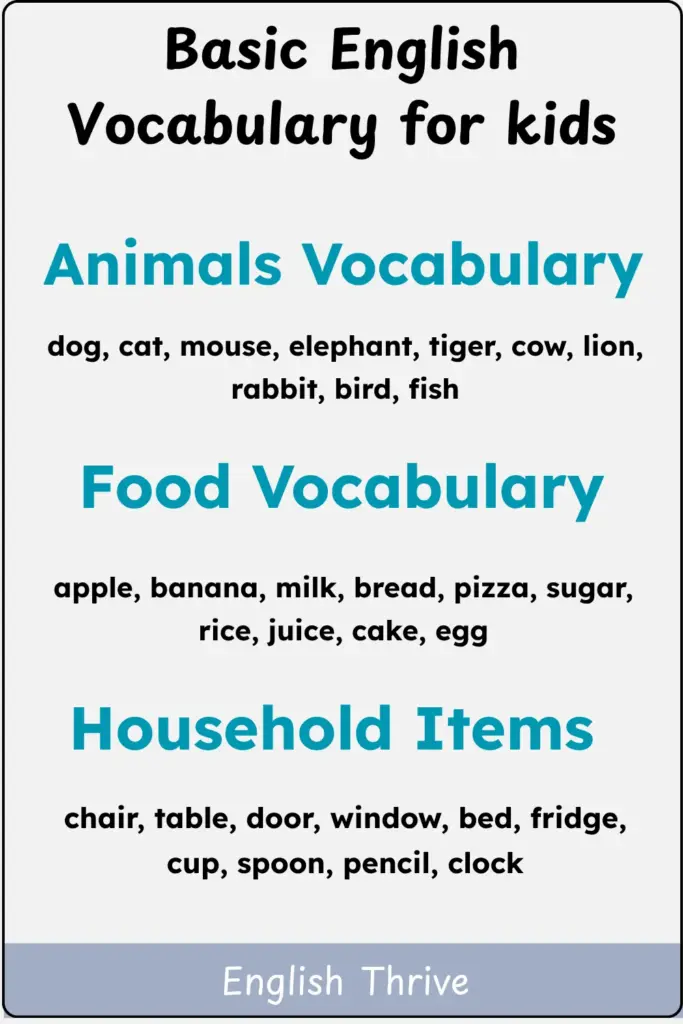A strong word list helps kids talk, read, and learn with ease. Kids learn new words fast when learning feels fun. This is why teaching vocabulary for kids matters so much in early English learning.
In this guide, you will find easy word lists, fun games, simple word groups, and clear teaching tips. You can use them at home or in class. No matter who you are—a parent, teacher, or tutor—these ideas will help kids enjoy learning new words.
Contents
ToggleWhat Is Vocabulary for Kids?
Vocabulary is the set of words a child knows, understands, and uses in daily life. Kids build vocabulary through listening, reading, speaking, and playing.
Two types of vocabulary:
- Active Vocabulary: Words kids can say or write (e.g., “apple,” “play,” “red”).
- Passive Vocabulary: Words kids understand but do not use yet.
A rich vocabulary helps children follow instructions, express feelings, read stories, write better sentences, and speak with confidence.
Why Vocabulary Matters for Kids
A strong word list helps kids in many ways. It helps them:
Share their thoughts
Understand stories and lessons
Read, spell, and write better
Talk about their feelings
Speak with confidence
Do well in class and in games
Kids who know more words learn faster. They understand more of what they hear and read.
Basic English Vocabulary for Kids
Here are simple, easy-to-learn words grouped by themes kids see in everyday life.
Animals Vocabulary for Kids
dog, cat, mouse, elephant, tiger, cow, lion, rabbit, bird, fish
Food Vocabulary for Kids
apple, banana, milk, bread, pizza, sugar, rice, juice, cake, egg
Household Items
chair, table, door, window, bed, fridge, cup, spoon, pencil, clock
Colors
red, blue, yellow, green, black, white, pink, orange, purple, brown
Body Parts
hand, face, eye, foot, leg, ear, nose, mouth, hair, finger
Word Categories Kids Should Learn Early
Sight Words
Kids should memorize these without sounding them out.
the, is, are, here, come, go, this, that, and, to, me, you, we
Compound Words
Two words combined to make a new one:
sun + light = sunlight
rain + bow = rainbow
butter + fly = butterfly
snow + man = snowman
Adverbs for Kids
quickly, slowly, happily, loudly, softly, neatly, bravely
Word Families
Words that share one pattern:
- clean, cleaner, cleaning
- jump, jumping, jumper
- play, player, playing
Effective Strategies to Teach Vocabulary for Kids
Kids learn fast when the lesson is simple, clear, and fun. Here are easy ways to help kids learn new words:
1. Start with Nouns
Use words kids can see and touch. Try animals, food, toys, and colors.
2. Use Repetition and Pictures
Flashcards, photos, labels, and actions help kids remember words.
3. Use Stories and Songs
Short stories, rhymes, and songs help kids learn words in a natural way.
4. Play Fun Word Games
Try “I Spy,” charades, Pictionary, matching games, or treasure hunts.
5. Use Words in Real Life
Say the word as you use it. For example: “Pick up your blue cup” or “Let’s cut the apple.”
Below is your high-readability (Grade 1–3 level) rewrite of the entire “Class-Wise English Vocabulary for Kids” section.
Sentences are short, simple, and easy for young readers or parents to follow.
Meaning is fully preserved.
Class-Wise English Vocabulary for Kids
Kids learn words best when they learn them step by step. Here is a simple list you can use at home or in school.
Pre-Primary (Nursery–KG)
Young kids learn through pictures, sounds, and daily objects.
Key Word Groups
| Category | Words |
|---|---|
| Colors | red, blue, yellow, green, pink |
| Shapes | circle, square, star, triangle |
| Animals | dog, cat, cow, lion, elephant |
| Fruits | apple, mango, banana, grapes |
| Actions | eat, run, jump, sleep |
| Family | mom, dad, baby, sister |
| School Items | bag, book, pen, table |
| Body Parts | eyes, ears, nose, hands |
Goal: Kids should say and point to these words with ease.
Class 1–2: Foundational Vocabulary
Kids now read short lines and simple stories. They need clear, common words.
Key Word Groups
| Category | Words |
|---|---|
| Sight Words | the, is, am, are, that, it, here, go |
| Nature | sun, moon, sky, rain |
| Actions | jump, laugh, cry, read, play |
| Describing Words | big, small, happy, sad, hot |
| Household | bed, cup, door, spoon |
| Emotions | angry, excited, scared |
Goal: Kids should use these words in short sentences.
Class 3–4: Functional Vocabulary
Kids start writing small paragraphs and explaining ideas.
Key Word Groups
| Category | Words |
|---|---|
| Adjectives | clean, dirty, kind, noisy |
| Verbs | swim, climb, draw, think |
| School Words | recess, homework, notebook |
| Time Words | today, tomorrow, morning |
| Opposites | fast–slow, open–close |
| Places | park, zoo, market, hospital |
Goal: Use these words in stories and talks.
Class 5–6: Intermediate Vocabulary
Kids begin to learn deeper ideas and school topics.
Key Word Groups
| Category | Vocabulary |
|---|---|
| Emotions | nervous, confident, curious |
| Subjects | science, geography, experiment |
| Technology | computer, screen, internet |
| Values | honest, polite, fair |
| Environment | pollution, conserve, habitat |
| Advanced Verbs | discover, explain, compare |
Goal: Use these words in essays, debates, and class tasks.
Thematic Vocabulary for Kids
Teach words through themes. It helps kids connect words to real life.
| Theme | Vocabulary |
|---|---|
| Food | rice, bread, juice, sandwich |
| Clothes | shirt, socks, shoes, cap |
| Travel | bus, car, train, ticket |
| Festivals | Christmas, Diwali, lights, gifts |
| Weather | sunny, rainy, windy, hot |
| Animals | pet, wild, bird, insect |
Teaching Tip:
Make posters or flashcards for each theme and use them during playtime or reading time.
Fun Vocabulary Games for Kids
Kids learn best when learning feels like play. Here are some fun word games to try:
1. Pictionary
Draw a word. Let kids guess the word from the picture.
2. Word Bingo
Say a word out loud. Kids mark the word on their bingo card.
3. I Spy
Say, “I spy something starting with B.” Kids look around and find the object.
4. Charades
Act out a word like “run,” “sleep,” or “dance.” Kids guess the action.
5. Treasure Hunt
Hide word cards around the room. Give kids clues to find them.
6. Matching Cards
Match pictures with words. Or match opposites or synonyms. This helps kids learn and remember words.
Daily Vocabulary Routine for Kids
A simple daily routine builds strong vocabulary over time.
Morning: Word of the Day (10 minutes)
- Introduce one new word.
- Say it aloud 3–4 times.
- Show a picture.
- Ask the child to use it in a sentence.
Mid-Morning: Quick Practice (10 minutes)
- Flashcards
- “Odd One Out”
- Rhyming words
- Mini writing prompt
Lunch Talk Vocabulary (5 minutes)
Challenge kids to use one new word in a sentence during lunch.
Afternoon: Story + Activity (15 minutes)
- Read a short story and pause at new words.
- Fill-in-the-blank worksheets.
- Draw and label new vocabulary.
Evening Word Play (10 minutes)
- Play charades or matching games.
- Quick review: “What word did you learn today?”
Role of Technology in Building Vocabulary for Kids
Today, kids learn many words with the help of simple tech tools. These tools make learning fun and fast. Kids enjoy bright pictures, sounds, and games. These help them learn and remember new words with ease.
Helpful Tech Tools for Kids
Vocabulary Apps: Duolingo ABC, Lingokids, ABCmouse
Videos: Story videos on YouTube Kids and fun word lessons
Flashcard Apps: Quizlet, TinyCards
Online Classes: Live classes with teachers and quick feedback
Pronunciation Tools: Kids can hear each word and say it out loud
Important Notes:
Keep screen time short and balanced. Use tech tools to support learning, not replace real talk, reading, or play.
Final Thoughts
Kids build strong vocabulary when they start with simple, daily words. They learn better when their learning feels fun. Games, stories, songs, and real-life tasks help kids remember new words for a long time.
With the right tools—like worksheets, word lists, and daily habits—your child can grow into a confident reader and speaker. Start small. Keep going. Celebrate every new word your child learns.
FAQs about Vocabulary for Kids
Q1. What are some fun ways to teach vocabulary to kids?
Use flashcards, picture books, rhyming songs, storytelling, and games like charades or “I Spy.”
Q2. How many English words should a 6-year-old know?
Most children know 1,000 to 1,500 words by age six.
Q3. Can I teach vocabulary at home without a tutor?
Yes! Use storybooks, worksheets, labeling, conversation practice, and word games.
Q4. Why is vocabulary important for kids?
It improves speaking, reading, writing, comprehension, and overall confidence.
Q5. What are 10 basic vocabulary words for kids?
apple, cat, dog, red, happy, run, sun, fish, play, book
Q6. What is the fastest way to improve vocabulary?
Daily reading, word repetition, themed vocabulary learning, and short fun games.
Q7. What causes poor vocabulary skills in kids?
Lack of reading, limited conversations, minimal exposure to new words, or learning without context.



